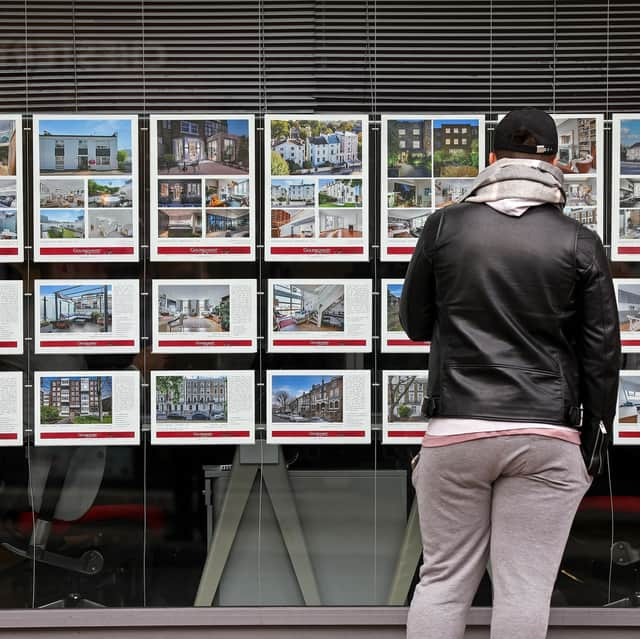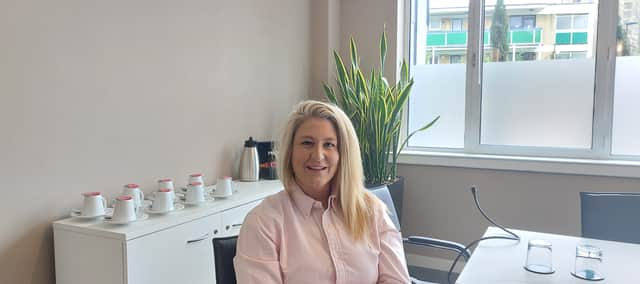Cost of living crisis: How have young people's dreams of house ownership in Portsmouth been affected?
and live on Freeview channel 276
More specifically, how has it impacted a lost generation of 20 to 35 year olds, and their dream of owning a home. A dream that has grown more difficult to achieve, as mortgage rates rise and the feasibility of saving a deposit becomes more challenging. Of course, the cost of living crisis has affected all age groups, but when framed with buying house, the first step on the property ladder is the hardest one to reach. With a general election around the corner, the 20-35 age group will be a key demographic that all political parties will be trying to engage with, yet their voices are not always heard or represented.
Advertisement
Hide AdAdvertisement
Hide AdWe asked our readers for advice on how to save money for a property, and beyond time travelling back to the 1980's or waiting for an inheritance, it is clearly a challenging and divisive issue. Saving enough money for a deposit is difficult, even if you are living at home with parents there are other costs that can drain your funds. If you are in a rented property? Then it is even harder, with the cost of rent increasing, that is where the bulk of income will be spent. If you throw into the mix a young family, then saving can be nigh on impossible.


Conditions in Portsmouth
According to the Office of National Statistics, wages in Portsmouth are in the lowest band in the country with a median monthly pay of £2,223 per calendar month, which works out at £26,676 per annum. That is the middle figure, so many people are being paid less than that but it is useful to be used as an average. While we do not have the statistics of average earning per age group locally, we do have a national average. The national median monthly earnings is higher than Portsmouth, at £2,331pcm, however 18-24 year olds have a lower median pay of £1,642 and 25-34 year olds have a median of £2,526. In applying the national pay for the age groups to Portsmouth, the areas median pay of £2,223pcm is a fair reflection of the 20-35 year old age group with the caveat that some will be earning more and less.
With a ball park figure for earnings in Portsmouth, we can now look at the property market to show the difficulties faced by young people that want to buy their first home. Rightmove states the average property price in Portsmouth (PO2) as £237,923 (figures from October 2023) with flats coming in at just over £160,000 and terraced houses just over £250,000. Generally prices outside of the city are higher, barring premium properties in desired locations such as Southsea, Old Portsmouth and Gunwharf.
To get a mortgage you need a five per cent or 10 per cent deposit which is an area that a lot of people are struggling with in the current financial climate. Saving five per cent of the average Portsmouth property at £12,000 is challenging enough let alone 10 per cent at £24,000. The deposit amount will also affect the interest rate, with a smaller deposit resulting in higher monthly repayments. That also does not take in to consideration the extra costs required to move, removal men, furniture etc. Even if you are a couple saving, or friends, if you are paying rent or have a young family, the task becomes daunting.
Advertisement
Hide AdAdvertisement
Hide AdA loose way to work out how much of a mortgage you could get is by multiplying your salary by 4.5 (this is a crude measurement, there are more accurate mortgage calculators online). In applying this to the median Portsmouth salary of £26,676, our hypothetical everyday person would be able to get a mortgage of around £120,000. Even someone with a 10 per cent deposit, would not be able to afford a flat.
View from an expert
To get a greater insight into the market and conditions, Nicola Schutrups, managing director of The Mortgage Hut, spoke about the challenges facing young people. She said: "As a company, we receive about a 100 new enquiries a day. Before the cost of living crisis it was about 50 per cent purchases and 50 per cent reportages, but since then it is about 90 per cent re-mortgages. Purchases have really suffered because people just can't afford to move unless they have to.
"We have hardly any first time buyers coming through. Those that have been saving for a deposit had a figure in mind of how much they needed, and then overnight almost it changed and they needed a bigger deposit or their monthly payments would be unaffordable. I would say they have been affected the most"


Interest rates on mortgages have varied over the past couple of years, at times they have rocketed up but some offers have been moving down in the right direction. Nicola said: "We have a couple of lenders which have just come out with offers just below 4 per cent, two years ago we would have been laughing at those rates but now we are cheering if we get one starting with a three. There are still some lenders, if you only have a five per cent deposit and there are other issues in the background, that are seven or eight per cent which is really high. Two years ago we had rates of 0.9 per cent."
Advertisement
Hide AdAdvertisement
Hide AdWhile there still lenders prepared to offer mortgages to people with five per cent deposits, Nicola advised these will be mainly applicable to people with clean credit ratings and will have a knock on effect to their interest rates. In the past the government have introduced schemes to help first time buyers but there is a dearth of offers available at the moment.
Nicola said: "We are at a point where we have the least amount of schemes available, certainly from over the last seven years, than we have ever had. Shared ownership is an ongoing option for people, where you just buy a share in the property and rent the remaining from the housing association. That's good because you need a much smaller deposit, the downside is you are then paying rent for the share that you do not own, plus a service charge and ground rent. It can work out more expensive in the long run than buying a whole house."
One of the main issues with getting on the property market is availability of houses and the increase in rent making it difficult to save. Nicola said: "Getting onto the property ladder is difficult, but what are the alternatives? Rent is at an all time high, it went up over eight per cent last year, so the average rent is actually more expensive than the average mortgage. If you can get over the barrier of the deposit then 9 times out of 10 your mortgage repayment will be cheaper than rent.
"The average mortgage across the south coast is £1,073 and rent is £1,220. It's a real conundrum and a tricky situation. I have a 16 year old daughter and I'm not sure how she will ever be able to afford to move out. It's more expensive to rent than to own, and that's without looking at bills and other expenses."
Advertisement
Hide AdAdvertisement
Hide AdWith the increase in mortgage rates, lenders are pushing back on applications, and Nicola has seen a rise in fraud with people desperate to get mortgages approved. She said: "We have definitely seen more declines or amended lending amounts in the last 18 months than ever before. Mortgage fraud is also on the rise as people get more desperate for housing. They may not see it as fraud but they will try and manipulate figures and get around the rules. We have definitely seen an increase in the number of mortgages put forward that are not being accepted. Still a low amount but a definite increase."
Watch the video imbedded in this article for more details.
We would like to hear from you. Are you 20-35 years old and struggling to get on the property market? Please get in touch via [email protected]
Comment Guidelines
National World encourages reader discussion on our stories. User feedback, insights and back-and-forth exchanges add a rich layer of context to reporting. Please review our Community Guidelines before commenting.